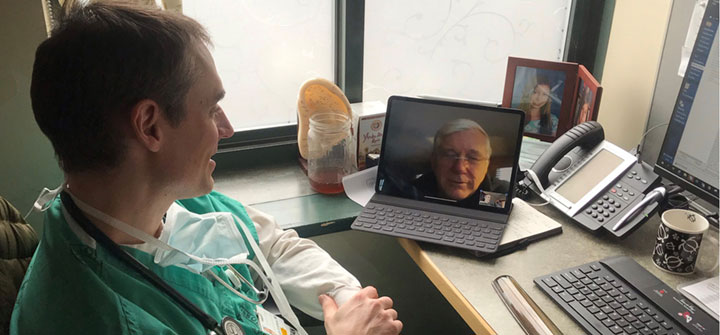Video Visits
What Is a Video Visit?
A video visit is a secure online appointment between you and your provider using a computer, tablet or smartphone. Both you and the provider are able to see, hear and speak to each other, similar to using FaceTime. Your video visit is private and not recorded – only you and your provider participate in the appointment and it’s completed in real time.
How Can a Video Visit Help Me?
- CONVENIENCE: You can see and speak with your provider from the comfort of your home.
- SAFETY: By staying home, you’ll help slow the spread of illnesses, like COVID-19, and protect yourself from others who may be sick.
- EFFICIENCY: Without the need to travel, you’ll save time and money.
- SECURITY: We use strict, HIPAA-compliant videoconferencing technology designed to protect your privacy and the security of your health information.
Which Departments and Practices Offer Video Visits?
Most departments, from primary care to specialty programs, are equipped with video visit capabilities. Contact your provider’s office to discuss your health needs and let them know you’re interested in a video visit.
Pediatric Video Visits
Our pediatric providers also offer video visits, and can treat injury and illness as well as provide routine care for your child. To find out if a video visit is right for your child, please contact your pediatric primary care office.
Preparing For Your Video Visit
Your video visit will take place on your choice of smartphone, computer or tablet, either through MyChart or Zoom. Your provider’s office will give you details on how to access your visit after you make your appointment.
To learn more about each type of video visit, click on the links below. If you need technical assistance please call our Patient Technology Helpline at (802) 847-1830.
Video Visits Frequently Asked Questions
You and your care team will determine if this type of visit is appropriate for your health needs. You can also use MyChart to request a video visit. If your health need can be addressed using video, your video visit will be scheduled and you will get a confirmation from MyChart, along with information on how to prepare for the visit.
Yes. Providers have access to your electronic medical record, and as with office visits, each can electronically order prescriptions and write medical orders based on the patient’s need.
Your visit is private and confidential. We use technology that, by law, must include HIPAA-compliant security methods to protect privacy and security of your health information. Only those whom you have agreed to participate in the visit may see and hear it.
No, Vermont law does not allow any recording to be made of patient video visits. Also, by law, patients are not allowed to record it from their end.
Yes, those who participate in your care may be present.
Most insurance carriers allow for some type of telemedicine visit. Eligibility and coverage, however, may vary from one insurance to another. Your care team will be able to help you understand how this impacts you.
If, during your video visit, your provider determines that you need to be seen in-person, the office staff will work with you to find a convenient time for you to come in. Standard office visit charges would apply.
No, you will not be penalized from receiving further care just because you decide not to continue with the video visit. We would just ask that you call the office to cancel or reschedule the appointment just as you would do if you had an in-person appointment.
Yes, your provider’s notes will be entered into your record just like an in-person visit. Like your other medical records, you have the right to access the provider’s visit notes. You can find the visit notes in MyChart under Visits, by clicking on the View After Visit Summary link.
Video visits and other telemedicine services have been studied and confirmed by decades of research and demonstrations to be a safe, convenient, and often cost-effective way to provide healthcare services.
- Test your device or computer 24 hours before your appointment. If you have any questions, call our Patient Technology Helpline at (802) 847-1830.
- Use a hardwire connection, not Wi-Fi, when possible.
- Adjust the camera to your eye/forehead level.
- Sit in a quiet, private room with no distractions.
- The light source should be directed toward your face. Do not sit with a window behind you.
- Maintain eye contact.
- Speak clearly with normal tone and volume.
- If you have problems hearing or seeing the provider, let them know.

